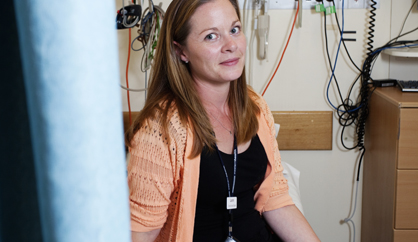In her mission to educate and to promote evidence-based care, Lauren Boxsell has been a source of inspiration at the Melbourne hospital where she works.
Meet Lauren Boxsell, Clinical Nurse Educator in the emergency department at Box Hill Hospital in the east of Melbourne – nominated by readers for her outstanding commitment to the profession through education.
As part of her role, Boxsell is responsible for supporting and motivating the nursing team, including students, in the Hospital’s emergency department in the delivery of excellence in clinical standards and evidence-based best practice.
Described by colleagues as highly motivated, an exceptional role model and a significant asset, Boxsell ensures ongoing development for staff and compliance with mandatory requirements as well as training and simulation for recognition of deteriorating patients.
Her dedication to education makes her the perfect candidate for mentoring the clinical nurse specialists and emergency staff members – which she does in addition to managing the ED nurse education team.
In 2012, she was awarded the Eastern Health “Aspire to inspire” award in recognition of her work as ED educator creating a culture of learning and evidence-based practice in the emergency department.
We spoke to her about what drives her passion for education, her teaching style and what she loves most about her job.
What are your key responsibilities in your role as clinical nurse educator?
To support and guide the translation of evidence-based knowledge into nursing clinical practice, collaboration with key stakeholders to optimise education and patient care, to participate in strategic planning and development activities and to work towards meeting the needs of a sustainable nursing workforce in the provision of patient-centred clinical care.
I also need to meet the learning needs of the ED nursing team, facilitation of the post-graduate nursing program on-site, the transition to speciality practice program, identifying staff for up-skilling and organising training and ongoing clinical support.
I also collaborate with a wide range of clinicians and educators from various areas including ICU, CCU and OT to develop and run study days across Eastern Health for all nursing staff, and work with ED consultants to assist with continuing medical education (CME).
What do you enjoy most about your job?
I enjoy watching students and staff grow and develop and gain confidence in their skills and knowledge. Working in a dedicated and progressive team helps sustain me and together we’re able to support staff to achieve their goals.
Most importantly, my job allows me to share with others my passion for emergency nursing and education to improve patient outcomes.
What are some of the biggest challenges in your area?
My main challenge is ensuring that the whole nursing team has access to formal and informal learning opportunities and experiences. I also need to tailor individual goals and objectives for all nursing staff regardless of level of experience or type of learner.
In what ways does your role encourage the advancement of nursing education through teaching, research or service?
- Initiating a combined nursing and medical mortality and morbidity case presentation for review and reflection of sentinel events in the ED.
- The development of specialty rotations to promote increased experience in the care of the paediatric patient.
- Being an active participant on committees including the Eastern Health paediatric working party, advanced life support review committee to review and standardise resources across the network; the door to decision maker working party and department streaming working party to improve patient experience and flow.
What programs, workshops or initiatives have you developed that highlight innovation in nursing education?
Some of the initiatives I’ve been responsible for include low-risk patient transfer and ISOBAR handover to improve communication and facilitate and streamline safe patient transfer from the ED. This is being reviewed for use in other EDs.
I’ve recently developed guidelines and tools to allow ED nursing staff members to rotate through the paediatric ward. This was initiated based on staff and department learning needs.
How would you describe your teaching style?
Accessible, approachable, interactive, facilitative, empowering.
What innovative ways have you found to communicate knowledge to students?
- Incorporating simulation into education programs.
- Regular multidisciplinary inservices and study days.
- Weekly tutorials for post-graduate students which reinforce their online learning and are tailored to the current specific learning needs of the group.
- A monthly journal article emailed to all staff with associated questions for consolidating their learning.
- “ECG of the month” for all staff, displayed for comment and discussion.
Why is improving education in the workplace so important to you?
I believe there’s a direct correlation between improving education and the quality of patient care and their experience.
Do you have an idea for a story?Email [email protected]
 Aged Care Insite Australia's number one aged care news source
Aged Care Insite Australia's number one aged care news source

